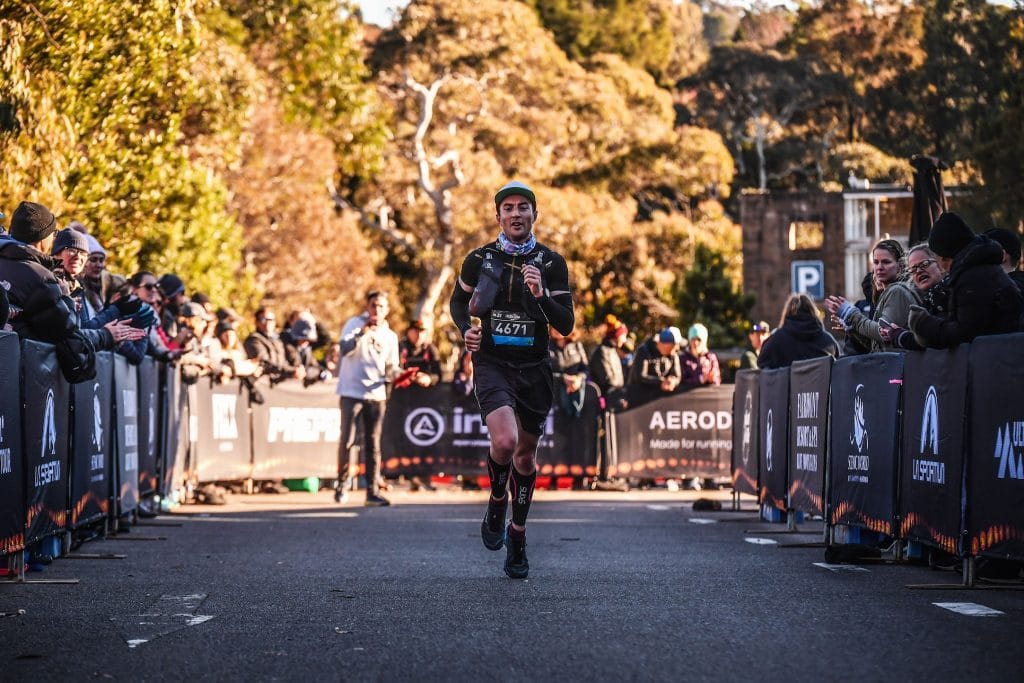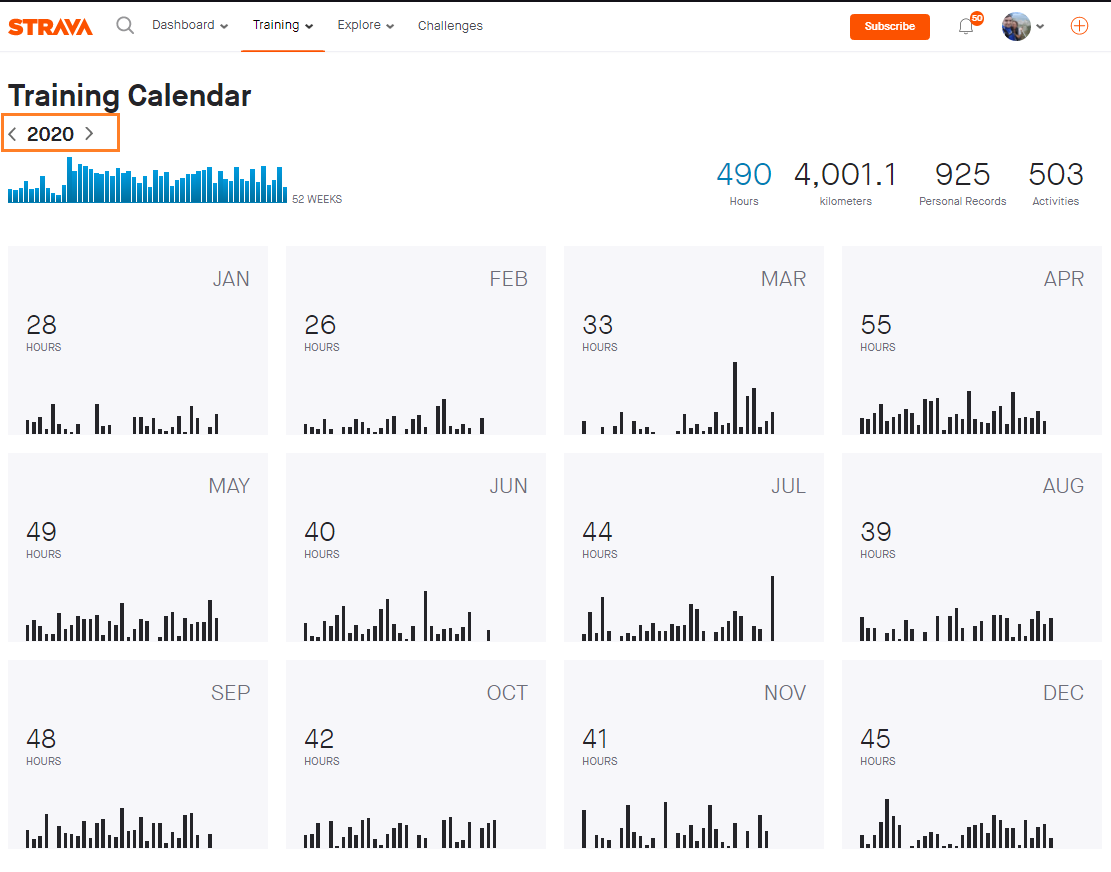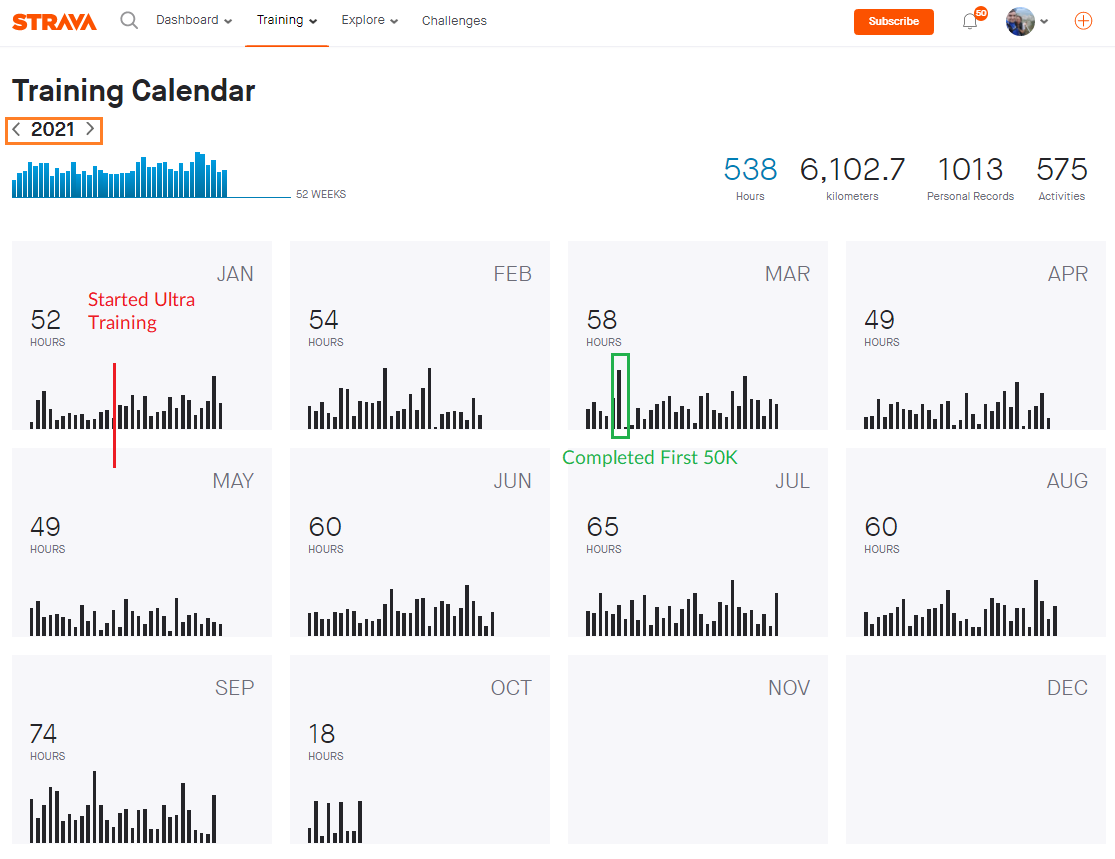I got into the more serious side of running in late January (28/01/2021) when I signed up for my first 50K ultramarathon. To say I did any real research or planning would be a huge overstatement. My longest run to that date was around 20K – I knew I had to start running much longer distances to
- Mentally prepare myself to KNOW that I could do 50K in a day
- Physically prepare myself to run my ultra best
My training plan was simple – run more and run long on the weekends. Here’s a simple time series of my training via Strava:
Some time in mid 2021, I set myself a more far reaching goal – to compete and complete the holy grail of Ultra Marathons: Ultra Trail du Mont Blanc (UTMB) (171 km +10,040 m) in Chamonix, France. When I decided this sounded fun and right up my alley, I started to again feel similar to that time in January – inadequately prepared by such an overwhelming test of physicality. I wanted to get good and set myself up for my ultra-best with more of a plan than ‘I’ll just do longer runs’. I set out and decided to hire a running coach as a shortcut to learn what I needed, however that didn’t turn out as planned so here I am, learning and training myself to become an ultra endurance runner. I am no expert and only a few months into ultra endurance training and still learning, but from my learnings I want to cover these areas:
Planning & Learning
- Training Schedule (Weekly / Monthly Google Sheet) – I set up a training sheet which I update weekly or monthly. It will include ideas and locations for hills. It’s also good to tally up your training if you can be that dedicated.
- Race Planning: Find the races that really interest you. Ensure you know how to qualify for them. Train for the race as close as you can. E.g UTMB is 170K with 10K elevation. Break it down – how much do I expect to run, hike, uphill, downhill, etc. Try to base your training around this.
- Coach – consider getting a coach, running form assessment and understand how different training techniques can improve your body and mind.
- Podcasts – Good to listen to while running for all running topics. My favourite: Science of Ultra and also Mile27
- Friends
Physical Training
Types: variety is the spice of life. If you do anything too much it’s surely not good for you. Mixing up your runs (from what I understand) will improve overall versatility and ensure your muscles are prepared.
- Long Runs: Up to 40% of overall weekly time. Less than 5 hours unless you are training mentally or gut testing. Probably want to do a big one (8+ hours) around 6-8 weeks out in case you get injured. This is a good mental boost and test gear, gut and mind.
- Speed (Intervals, progressive, Fartleks, etc): Usually 1-1.5 hour sessions. Want to be doing minimum 30 minutes of actual speed running when you go out. Remember to be specific, Usually don’t want to be doing 100m sprints when you are training for a 170K race. Longer efforts will be more effective:
- e.g 3min * 10 efforts or 8min * 4 efforts. Etc. My pace for this training will be 5-10km
- pace (3:00 fastest)
- Fartleks can be fun when combining with Strava segments. You don’t need to do consistent times / repeats. Effort is the main factor. E.g Segment 1 ~6mins, Segment 2 ~12mins, Segment 3 ~5mins, Segment 4 ~5mins.
- Hills / Hiking: UTMB will have a lot of climbing (roughly 5.9% overall course (10K/170K)). Although not always possible, best to try to replicate near this in your weekly schedule. I.e 100K per week = 5.9K elevation. Similar to intervals, I want to get in ~20minutes of actual climb time as well as descent time. I.e 6 * 4mins, 3 * 7mins
- Comfortable Runs: These are the usual runs. Comfortable (talking) pace. These are to put some more mileage in the legs when fatigued or to impede further fatigue. These will usually be in between the harder (speed, hills, long) sessions.
- Strength & Mobility:
- Personally, stretching after running works for me. I have a sauna so it’s my place. I’ve never been flexible and something I want to properly try. After (almost) every run.
- Strength has become more important as I’ve done more running although I still need to put more emphasis on it. Hip flexors (slide 5 & 6). Also don’t want to have runners arms, so it can be good to fit in some upper body through F45 or the like. Core is also very important so put in some situps with focus on obliques. One F45 per week, each walk (usually every 1-2 days) do a few situps.
- Rest: something I’m not very good at but a quote I like to paraphrase – when you are training you are hurting / tiring out your muscles. When you are resting they are recovering and becoming stronger. Like a senzu bean.
Nutrition & Gut Training
- Consider hiring a nutritionist or at least researching…
- Training and prep
- For runners, carbs are good. Low GI is best. Eat more wholemeal
- Eat 1-2hours prior to a run, test and see if you can bring this down
- Eat less sugar
- Get to an efficient weight
- Eat more fiber
- Try glycogen depleted runs
- The Long runs
- You shouldn’t need food top ups for less than 2 hours
- Take food for anything longer than 2.5hours
- Good idea to nibble every hour instead of large amounts
- Test food and gels, gels also expensive, you can make your own and test your own foods
Other
- Mental – you won’t know if you don’t attempt something tough. Chafe is still the most scary thing for me… something I need to further test. If you can test something before the big day it’s best to try it and give yourself that confidence boost
Final Words
Everyone is capable of training themselves with the right commitment and learning. Like a diet, find something that works for you, if you can’t stick to your training plan, look at changing it up to make it fun – strava segment seeking and weekly planning can actually be fun. I have shared some of the things I have started reading, learning and planning to improve my running to achieve my goals. I’ll test and improve this as I go through the stages to see what works and does not work for me.
If you’re to take one thing from this, think to make yourself Training Schedule (Weekly / Monthly Google Sheet)




